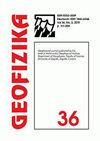Empirical criteria for the accuracy of earthquake locations on the Croatian territory
IF 1.1
4区 地球科学
Q4 GEOCHEMISTRY & GEOPHYSICS
引用次数: 3
Abstract
This paper presents the empirically based ground truth criteria, or shorter GT criteria, for the estimation of the epicentral location accuracy of the seismic events recorded at network stations within 400 km around the city of Zagreb. The criteria are based only on the network coverage metrics and the GT5 level represents an absolute location error lower than 5 km. They have been developed using a bootstrap resampling method: same earthquakes have been relocated many times but with different, randomly selected seismic stations. We used 330 reference events taken from the pages of ISC (ISC Reference Event Bulletin, 2008) and showed that the location accuracy is most affected by the distance to the farthest station in the seismic network, while not at all influenced by the distance to the nearest. The developed GT criteria for GT595% level of accuracy require 10 or more network stations, all within 125 km from the epicentre, and the secondary azimuthal gap (the largest gap when any given station is removed from the network) less than 200°, or the network quality metric (the deviation between the optimal uniformly distributed network and the actual network) less than 0.41. The obtained results revealed that the global criteria are too restrictive and unsuitable for the studied area since they require more regular networks. With our criteria, it is possible to achieve higher accuracy for the networks with a bigger secondary azimuthal gap or greater network quality metric. In addition, our criteria limitations are shown for the areas with simpler geological structure.克罗地亚境内地震位置准确性的经验标准
本文提出了基于经验的地面真值标准,或更短的GT标准,用于估计萨格勒布市周围400公里范围内台站记录的地震事件的震中定位精度。这些标准仅基于网络覆盖指标,GT5级别表示绝对定位误差低于5公里。它们是使用自举重采样方法开发的:同一次地震被多次重新定位,但使用不同的随机选择的地震台站。我们使用了取自ISC (ISC reference Event Bulletin, 2008)页面的330个参考事件,结果表明,定位精度受地震台网中离最远台站距离的影响最大,而不受离最近台站距离的影响。制定的GT595%精度水平的GT标准要求10个或以上的台站,均在距震中125公里范围内,次级方位角差(任何给定台站从网络中移除时的最大差)小于200°,或网络质量度量(最优均匀分布网络与实际网络之间的偏差)小于0.41。结果表明,全局准则的限制太大,不适合研究区域,因为它们需要更规则的网络。使用我们的标准,对于具有更大的次方位角间隙或更大的网络质量度量的网络,可以实现更高的精度。此外,对于地质构造较简单的地区,给出了标准的局限性。
本文章由计算机程序翻译,如有差异,请以英文原文为准。
求助全文
约1分钟内获得全文
求助全文
来源期刊

Geofizika
地学-地球化学与地球物理
CiteScore
1.60
自引率
0.00%
发文量
17
审稿时长
>12 weeks
期刊介绍:
The Geofizika journal succeeds the Papers series (Radovi), which has been published since 1923 at the Geophysical Institute in Zagreb (current the Department of Geophysics, Faculty of Science, University of Zagreb).
Geofizika publishes contributions dealing with physics of the atmosphere, the sea and the Earth''s interior.
 求助内容:
求助内容: 应助结果提醒方式:
应助结果提醒方式:


